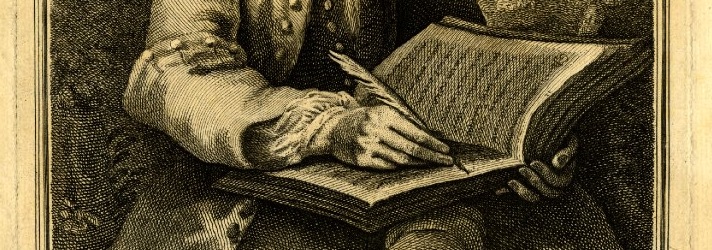CHRISTOPHER SMART
“A Noon-Piece; or, The Mowers at Dinner”
ODE II.
Jam pastor umbras cum grege languido,
Rivumque fessus quaerit, & horridi
Dumeta Silvani, caretque
Ripa vagis taciturna ventis. HOR[ACE].
The Sun is now too radiant to behold,
And vehement he sheds his liquid Rays of Gold;
No cloud appears thro’ all the wide expanse;
And short, but yet distinct and clear,
To the wanton whistling air 5
The mimic shadows dance.
Fat Mirth, and Gallantry the gay,
And romping Extasy ‘gin play.
Now Myriads of young Cupids rise,
And open all their joy-bright eyes, 10
Filling with infant prate the grove,
And lisp in sweetly-fault‘ring love.
In the middle of the ring,
Mad with May, and wild of wing,
Fire-ey’d Wantonness shall sing. 15
By the rivulet on the rushes,
Beneath a canopy of bushes,
Where the ever-faithful Tray,
Guards the dumplings and the whey,
Colin Clout and Yorkshire Will 20
From the leathern bottle swill.
Their scythes upon the adverse bank
Glitter ‘mongst th’ entangled trees,
Where the hazles form a rank,
And court’sy to the courting breeze. 25
Ah! Harriot! sovereign mistress of my heart,
Could I thee to these meads decoy,
New grace to each fair object thou’dst impart,
And heighten ev’ry scene to perfect joy.
On a bank of fragrant thyme, 30
Beneath yon stately, shadowy pine,
We’ll with the well-disguised hook
Cheat the tenants of the brook;
Or where coy Daphne’s thickest shade
Drives amorous Phoebus from the glade, 35
There read Sydney’s high-wrought stories
Of ladies charms and heroes glories;
Thence fir’d, the sweet narration act,
And kiss the fiction into fact.
Or satiate with nature’s random scenes, 40
Let’s go to the gardens regulated greens,
Where taste and elegance command
Art to lend her daedal hand,
Where Flora’s flock, by nature wild,
To discipline are reconcil’d, 45
And laws and order cultivate,
Quite civiliz’d into a state.
From the sun, and from the show’r,
Haste we to yon boxen bow’r,
Secluded from the teizing pry 50
Of Argus’ curiosity:
There, while Phoebus’ golden mean,
The gay meridian is seen,
Ere decays the lamp of light,
And length’ning shades stretch out to night—- 55
Seize, seize the hint—each hour improve
(This is morality in love)
Lend, lend thine hand—O let me view
Thy parting breasts, sweet avenue!
Then—then thy lips, the coral cell 60
Where all th’ ambrosial kisses dwell!
Thus we’ll each sultry noon employ
In day-dreams of exstatic joy.
NOTES:
Epigraph Horace, Odes, Book III, no. XXIX, lines 21-24. “Now the weary shepherd with his languid flock seeks the shade, and the river, and the thickets of rough Sylvanus; and the silent bank is free from the wandering winds.” Translation by Christopher Smart, The Works of Horace Translated Literally into English Prose (London, 1755).
2 vehement “Of heat…intense, strong” (OED).
5 wanton “Free, unrestrained” (OED).
16 rivulet “A small river; a stream” (OED).
18 Tray “A utensil of the form of a flat board with a raised rim, or of a shallow box without a lid, made of wood, metal, or other material, of various sizes” (OED).
27 meads Meadows; decoy “To entice or allure” (OED).
34 Daphne “In Greek mythology, the personification of the laurel;” here a reference to laurel bushes (Britannica).
35 Phoebus “Apollo as the god of light or of the sun; the sun personified” (OED).
36 Sydney Sir Philip Sidney (1554-1586), courtier, statesman, soldier, poet; his long pastoral romance, Arcadia, was published in 1593 (Britannica).
43 daedal “Skilful, cunning to invent or fashion” (OED).
44 Flora “In Latin mythology, the goddess of flowers; hence, in modern poetical language, the personification of nature’s power in producing flowers” (OED).
51 Argus “A mythological person fabled to have had a hundred eyes,” hence an allusion to the prying eyes of the curious (OED).
60 coral Red.
61 ambrosial “Exceptionally sweet or delightful” (OED).
SOURCE: Poems on Several Occasions (London, 1752), pp. 9-12. [Google Books]
Edited by Ulises Canchola

